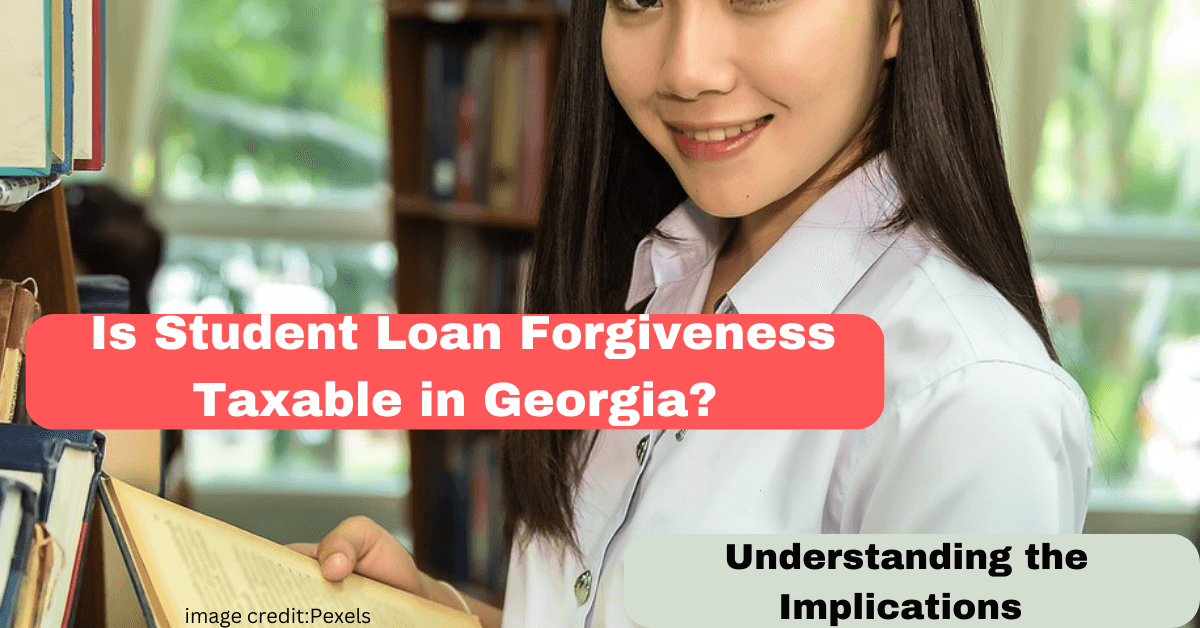Is Student Loan Forgiveness Taxable in Georgia? Understanding the Implications
Student loan forgiveness has been a significant topic of discussion, especially with various federal and state programs aiming to alleviate the financial burden for borrowers. However, a pressing question for borrowers in Georgia is whether forgiven student loans are subject to state taxes. This article delves into the details, offering insights into what Georgia residents need to know about the taxability of student loan forgiveness.

Understanding Student Loan Forgiveness
Student loan forgiveness refers to the cancellation or discharge of all or part of a borrower’s student loan debt. Federal programs like Public Service Loan Forgiveness (PSLF), Teacher Loan Forgiveness, and income-driven repayment plans often lead to loan forgiveness after meeting specific criteria. Additionally, some states, including Georgia, have their own forgiveness initiatives targeting specific professions or underserved communities.
While the idea of erasing student debt is appealing, borrowers must consider the potential tax implications, which can vary by state.
Federal Tax Rules on Student Loan Forgiveness
At the federal level, the American Rescue Plan Act of 2021 introduced a provision exempting forgiven student loans from federal income tax through 2025. This means borrowers benefiting from loan forgiveness programs, such as PSLF or income-driven repayment plans, do not need to report the forgiven amount as taxable income on their federal tax returns.
However, state tax laws can differ, and it’s essential for borrowers to understand how Georgia handles the taxability of student loan forgiveness.
Is Student Loan Forgiveness Taxable in Georgia?
In Georgia, the taxability of student loan forgiveness depends on the type of forgiveness program and the state’s tax regulations. While federal laws provide broad exemptions, Georgia’s tax code does not automatically align with federal tax provisions.
For instance:
- Public Service Loan Forgiveness (PSLF): Georgia generally excludes forgiven loans under PSLF from state income tax, aligning with federal rules.
- Income-Driven Repayment Forgiveness: If loans are forgiven after 20-25 years under income-driven repayment plans, the forgiven amount might be subject to Georgia state taxes.
- Employer-Paid Student Loan Assistance: Some employers offer student loan repayment benefits. If an employer repays a portion of an employee’s loan, it is often treated as taxable income in Georgia unless explicitly excluded by state law.
Key Considerations for Borrowers in Georgia
- Stay Updated on State Tax Laws: Tax codes are subject to change, and Georgia’s legislature could amend its treatment of student loan forgiveness in the future.
- Understand Your Forgiveness Program: Different forgiveness programs have varying tax implications. Borrowers should consult with their loan servicer or a tax professional to clarify their obligations.
- Keep Records: Proper documentation of loan forgiveness details, including the program under which the loan was forgiven, is essential for accurate tax filing.
Why Is Understanding Tax Implications Important?
The financial relief from student loan forgiveness can be substantial, but unexpected tax bills can diminish the benefit. For instance, if Georgia considers forgiven loan amounts as taxable income, borrowers may owe a significant amount in state taxes.
For example:
- A borrower who has $30,000 in loans forgiven might face a tax bill of several thousand dollars if the state tax rate is applied to the forgiven amount.
- Proper financial planning and understanding tax obligations can help borrowers prepare for any potential liabilities.
Exemptions and Exceptions to Consider
In some cases, forgiven student loans are not taxable, even under Georgia law. These scenarios typically involve:
- Death or Disability Discharge: If a loan is forgiven due to the borrower’s death or permanent disability, it is generally not considered taxable income.
- Certain Profession-Based Forgiveness Programs: Programs targeting specific professions, such as teachers or healthcare workers in underserved areas, may have tax exemptions.
Steps to Minimize Tax Burden
- Leverage Tax Planning Services: Work with a tax advisor to understand and minimize any potential tax liabilities.
- Explore State-Specific Forgiveness Programs: Georgia offers loan forgiveness options for professionals like teachers and healthcare workers. Investigating these programs could provide tax-advantaged relief.
- File Correctly: Ensure that your tax return accurately reflects the nature of your forgiven loan to avoid penalties or audits.
Future Outlook on Student Loan Forgiveness in Georgia
With the growing momentum behind student loan forgiveness initiatives, Georgia residents may see further alignment with federal tax exemptions in the coming years. Advocacy efforts at both the state and federal levels aim to ensure that forgiven loans provide maximum relief without imposing unexpected financial burdens.
Conclusion
The question, “Is student loan forgiveness taxable in Georgia?” is one that requires careful consideration of state-specific tax laws and the type of forgiveness program involved. While some forgiven loans may not be taxable, others could result in state tax liabilities. Borrowers should stay informed, seek professional guidance, and plan ahead to fully benefit from loan forgiveness without unwelcome surprises.
By understanding the nuances of Georgia’s tax treatment of student loan forgiveness, borrowers can navigate their financial futures more confidently and effectively.

